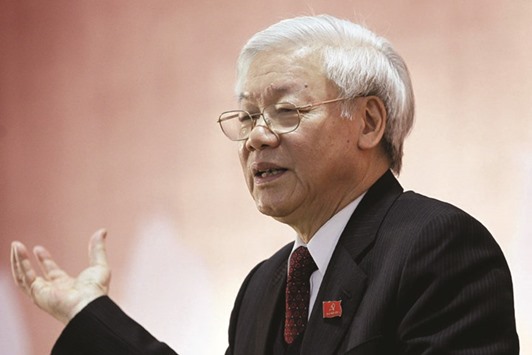Vietnam was to stick to conventional doctrine, but with a view to improving its effectiveness in the modern age, Communist Party general secretary Nguyen Phu Trong said yesterday.
The objective for the next five years was “to apply creatively and develop Marxist-Leninist doctrine and Ho Chi Minh’s ideology,” he said at the closing ceremony for the National Party Congress.
The eight-day assembly is held every five years to determine the leadership and key policy directions.
During the congress last week, a minister spoke out saying Vietnam’s political reforms have lagged behind its economic revival, preventing the country from fulfilling its potential.
“In the past 70 years, the organised structures, operational method of the party, the state, and organisations in different levels have almost not changed,” Bui Quang Vinh, the minister of planning and investment, said Friday, to applause from the 1,500 party members.
“In the last five years, we have made some economic reforms and achieved considerable results, but political reforms have not been made, so the results of this five-year period have not been as good as we expected,” he said in comments first made public yesterday.
Trong did mention any specific reforms in his closing speech, broadcast live, but said following existing doctrine was “consistent with the target of national independence and socialism.”
The party also set the economic goals for the next period, including a target growth of 6.5-7% per year on average between 2016 and 2020.
Such growth would bring per capita income to $3,200-3,500 from 2,109 in 2015. The government also said it aimed to bring the urban unemployment rate below 4% from 10% now.
Tron g, 71, secured a second term in his post after outgoing prime minister and potential challenger, Nguyen Tan Dung, withdrew his candidacy from a key party committee.
While Dung is considered a pro-Western reformer and friendly towards the United States, Trong is seen as taking a more cautious approach to economic reforms and being more friendly towards China.
Trong, the single-party state’s de-facto head of government, is also the head of the new politburo.
Among the new politburo members are the minister of public security Tran Dai Quang 59, who is expected to become president; and deputy prime minister Nguyen Xuan Phuc, 61, who is expected to be the new prime minister.
The party chief will take up his post immediately, while the president and prime minister must be approved by the new national assembly in mid-year. The assembly’s approval, however, has traditionally been a rubber-stamp procedure.
The new politburo members were elected by over 1,500 party members from across Vietnam. Under the country’s constitution, the general population plays no direct part in selecting the national leadership.

Vietnam Communist Party secretary general Nguyen Phu Trong
